FOR GOVERNMENT
Assure
Become the expert on delivering
valid and fair assessments for
your training and education.
FOR BUSINESS
Hire
|
Engage
|
Develop
|
|
Automatically match to candidates who are a great fit for your team culture and who are intrinsically motivated to succeed. |
Deeply understand your organisation with science-backed analytics on your culture, team design, and engagement. |
Back your onboarding, compliance and skill development with industry-leading credentialling, competency and capability expertise.
|
The AI that actually understands you.
Hey Compono helps you understand your personality and how to turn it into your superpower.
First 1,000 users get 10 minutes free.
Just $15 a month after that — cancel anytime.
Me, MY TEAM, My Company
My work personality is:
The Advisor 🧠
"Let's investigate the problem!"
Your personality has been mapped against the types of work crucial for high-performing teams.
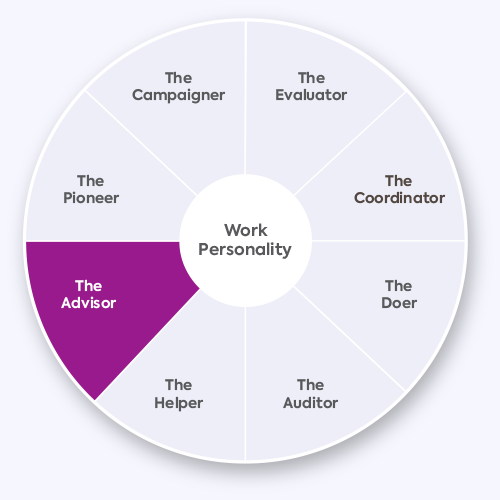
Introduction
This personality type is known primarily for their collaborative, mentoring, and counselling abilities. They are flexible, open-minded individuals who seek to understand and exhibit tolerance in a wide range of situations.
The Advisor is also noted for their diplomacy and strong encouragement of others. Their approachable nature makes it easy for others to share with them, further enhancing their likeability.
Main preferences for work
The Advisor is a distinct work personality that thrives on knowledge and growth. They possess a strong inclination for gathering and disseminating information, revel in roles that amplify their advising prowess, and thrive in environments that cater to their intellectual curiosity.
Advisors are sought-after for advice on intricate matters and are driven by a passion for fostering development in others.
- Enjoys gathering information, sharing knowledge.
- Values roles that use their knowledge-sharing capabilities.
- Prefers environments that allow for intellectual exploration.
- Appreciates being consulted on complex issues.
- Finds motivation in helping others develop and grow.
Potential blind-spots at work
Although robust and flexible, this personality type is not without its potential pitfalls. It's essential to highlight and understand these blind spots to harness strengths and counteract weaknesses. Here's a list of the potential blind spots that an 'Advisor' personality type might face, from over-accommodation to lack of urgency during crunch times.
- Can be overly accommodating, affecting decisiveness.
- May spend too much time exploring all possible options.
- Might avoid taking firm stances in conflicts.
- Occasionally lacks urgency in time-sensitive situations.
Tips for collaborating with this personality type
Driven by their natural ability to gather and analyse information, Advisors shine in consultant or mentor roles within the team. It's crucial to promote flexibility in their problem-solving approach and support their appreciation for diverse perspectives.
However, remember not to overlook their need for thorough research before decisions, press them into hasty conclusions without analysis, or neglect their prowess in diplomacy and mediation.
Do's
|
Don'ts
|
Knowing Me (worksheet)
Jam-packed with insightful questions, this is a worksheet all about you. Yes, you heard it right, YOU.
This worksheet is intended to help you delve deeper into your work personality and understand how you tick. And once you gain clarity about yourself, you won’t be keeping it a secret.
The "Knowing Me" worksheet is a fantastic way to share your insights with your team. By inviting your colleagues into your world, you are encouraging a more cohesive and understanding work environment.
So, let's get down to business and start filling it out, shall we?
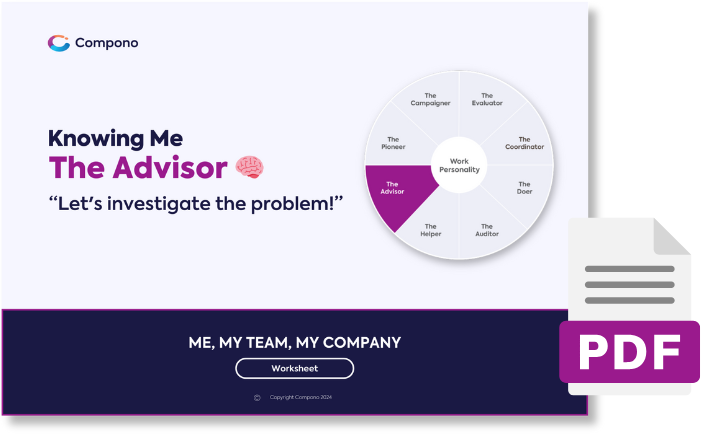
- Do you easily adapt to new situations, promoting team flexibility and adaptability?
- Do you encourage team harmony through empathy and understanding?
- Are you skilled at ensuring everyone's voice is heard and valued in the team?
Remember, these examples are just a starting point - your worksheet is your canvas to fill with your own unique colors and shades.
Guess who?
Peer into the minds of the world's most influential leaders 📣
Ever wondered if you share a personality type with Nelson Mandela, Steve Jobs, or perhaps Mother Teresa? Here's your chance to find out, but there's a catch! We aren't revealing them upfront.
Try guessing them first. As you click each mystery card, the leader will be revealed.
These leaders are flexible, empathetic, open-minded, collaborative, supportive, and adaptable. 🤔

This peaceful, and empathetic leader is globally renowned for his compassionate approach.
Dalai Lama 🧠
Known for his compassionate, open-minded, and collaborative approach to leadership, always emphasising peace and flexibility.

A Nobel laureate with a firm belief in education, she handles global challenges with empathy and flexibility.
Malala Yousafzai 🧠
Nobel Peace Prize laureate and advocate for education, admired for her empathy and flexibility in handling global challenges.

Known for leading The Huffington Post and Thrive Global with an empathetic, supportive, and open-minded style.
Arianna Huffington 🧠
Founder of The Huffington Post and Thrive Global, known for her open-minded, empathetic, and supportive leadership style.
Want to guess more influential leaders?
Career paths
In their professional lives, the Advisor is often found at their best when they are aiding others. Fuelled by their empathy and open-minded nature, they prefer dynamic workplaces where they can provide counsel and foster positive change.
Their unique ability to understand and connect with people positions them perfectly to thrive in careers that focus on human relations and interpersonal dynamics.
Advisors make excellent HR Business Partners, Consultants, or Generalists, where their empathetic and strategic skills can bring out the best in an organisation's talent.
Their passion for helping people grow can lead them to roles as Training & Development Managers or Learning & Development Specialists.
Advisors' creative side can be explored in fields like Interior Design or Graphic Design. Their people skills also allow them to shine as Travel Agents, Talent Agents, Life Coaches, or in any role that facilitates social interaction and enriching exchanges.
The full list:
- HR Business Partner or Consultant
- Training & Development Manager
- Learning & Development Specialist
- Mediator
- Organisational Development Consultant
- Talent Development Manager
- Interior Designer
- Travel Agent
- Talent Agent
- Life Coach
- Public Relations Specialist
- Graphic Designer
- Occupational Therapist
- Social Worker
- Counsellor
- Corporate Communications Specialist
- Rehabilitation Counsellor
- Corporate Social Responsibility (CSR) Manager
- Diversity and Inclusion Officer
Leadership style
Individuals have natural or preferred leadership styles that align with their personality types.
For Advisors, they may find aspects of their preferred leadership style easier or more challenging in certain circumstances. But that doesn't mean they can't adapt to specific situations.
Effective leaders are flexible and change their approach based on the situation.
By remaining flexible in their approach, Advisors can harness their strengths while also adapting to the team's needs and the demands of the task.
The Advisor's natural leadership style is:
Non-Directive Leadership

Directive Leadership involves providing clear instructions and goals, and expecting a structured approach from the team.

Democratic Leadership advocates for collaboration, shared decision-making, and appreciates team contributions.
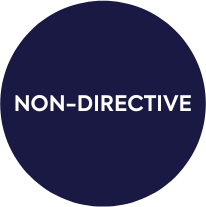
Non-Directive Leadership allows for team autonomy, offering guidance only when required.
What does this mean? 🤔
Non-Directive Leadership takes a hands-off approach, providing teams with autonomy and trusting them to make their own decisions. Leaders using this style focus on empowering their team, offering guidance only when necessary.
This leadership style is effective in environments that rely on innovation, where highly skilled teams require minimal supervision and are trusted to manage themselves. Read more.
HOW to ADAPT TO other situations
Any leadership style can be adjusted to fit different situations and team needs.
Click each tab below to discover what's easy and hard when adapting to each leadership style.
Select an option below:
- Directive
- Democratic
- Non-Directive
What's easy?
Advisors can take on directive leadership when necessary but prefer to guide rather than control. They may give direction in a way that feels collaborative and supportive.
Blindspots?
They will struggle with being overly rigid or controlling, as they naturally prefer a flexible approach and involving others in decision-making.
What's easy?
They may struggle with situations where teams need more structure or guidance, as they naturally tend toward flexibility and autonomy.
Blindspots?
Pioneers may struggle with situations that require more hands-on guidance, follow-up, or strict deadlines.
What's easy?
Advisors excel in democratic leadership as they value input from others and enjoy fostering collaboration. They are adept at finding balance between guidance and openness.
Blindspots?
They may find it hard to make firm decisions when there are differing viewpoints, as they don’t want to alienate or override others' contributions.
Want to be sure if
Directive Leadership,Democratic Leadership,Non-Directive Leadership
is right for the current situation or decision your team faces?
In 10 short questions, find out the most appropriate leadership approach you can use for every team situation.

Resolving conflict in teams
For leaders, conflict within a team can seem like a daunting challenge.
Yet, when equipped with a deep understanding of each team member's unique personality, leaders can harness these moments to foster growth, spark innovation, and cultivate harmony.
Below is practical advice for leaders to navigate such scenarios effectively, based on the personality types in their team.
Click each personality type below to see practical advice for a leader to manage conflict with the Advisor.
-
Pioneer 🤝 Advisor
Help the Pioneer stay focused on practical outcomes, e.g., “Can we agree on a timeline for these ideas to ensure progress?”
Encourage the Advisor to focus on decision-making, e.g., “Let’s set a deadline for making a final decision.”
-
Campaigner 🤝 Advisor
Help the Campaigner define clear, actionable goals, e.g., “What’s the first step in getting this idea started?”
Encourage the Advisor to set deadlines to avoid procrastination, e.g., “Let’s set a deadline to finalise decisions.”
-
Evaluator 🤝 Advisor
Help the Evaluator consider alternative approaches, e.g., “Let’s explore other options before finalising.”
Encourage the Advisor to set decision timelines, e.g., “Let’s ensure we finalise by the end of this discussion.”
-
Coordinator 🤝 Advisor
Encourage the Coordinator to integrate flexibility, e.g., “How can we adjust the plan to include creativity and flexibility?”
Help the Advisor drive decisions, e.g., “Let’s aim to finalise this by the end of the meeting.”
-
Doer 🤝 Advisor
Help the Doer be open to flexible approaches, e.g., “Can we adjust the plan to allow for new ideas?”
Encourage the Advisor to ensure timely decisions, e.g., “Let’s set a deadline to finalise this decision and keep the project moving.”
-
Auditor 🤝 Advisor
Guide the Auditor to engage more collaboratively, e.g., “Let’s integrate your detailed input into the broader plan.”
Help the Advisor focus on specifics, e.g., “We need to make sure all the details are accounted for before we finalise.”
-
Helper 🤝 Advisor
Encourage the Helper to assert their needs, e.g., “Please share your thoughts on how this decision might impact the team.”
Guide the Advisor to focus on decision-making, e.g., “Let’s make sure we find a resolution that works for everyone.”
-
Advisor 🤝 Advisor
Encourage both Advisors to balance flexibility with decision-making, e.g., “I appreciate your collaboration, but we need to make a decision by [time].”
Help them recognise that avoiding tough conversations may hinder progress, promoting constructive, honest dialogue.
DOES EVERYONE PLAY NICELY IN THE SANDPIT? 😉
Share the personality assessment with
your team and find out how to get along.
👇
Your personality has been mapped against the types of work crucial for high-performing teams.
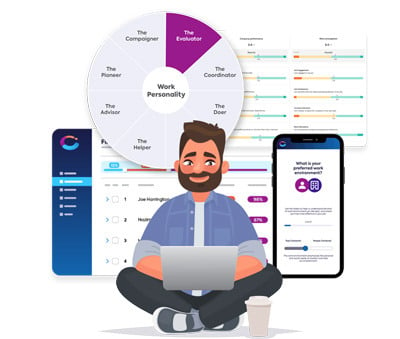
Designed by corporate psychologist, Rudy Crous.
Research identifies 8 key work types crucial for high-performing teams. If any work type shows weakness within a team, leaders can analyse the gaps and create plans to strengthen performance.
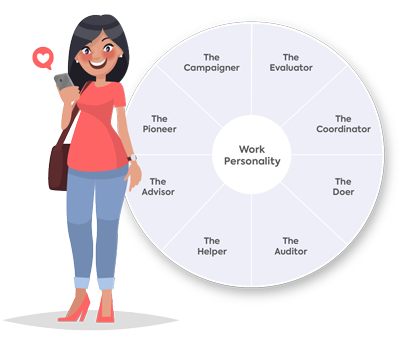
What is your Work Personality?
Reading a colleague's profile?
Or keen to take the assessment again?
Take this simple assessment and arm yourself with the insights needed to drive your performance to the next level.
Build high performing teams and individuals
Want to see more?
Our organisation design and people insights platform guides strategic people leaders to find their blind spots and take instant, actionable steps to improve.
Identify what "good" looks like
What makes your high-performers tick? Find out how they think so you can replicate their success across the business.
Reduce conflict and improve team collaboration
Help managers find potential areas of conflict in teams so that they can improve collaboration and performance.




.png?width=383&height=200&name=team%20(1).png)
